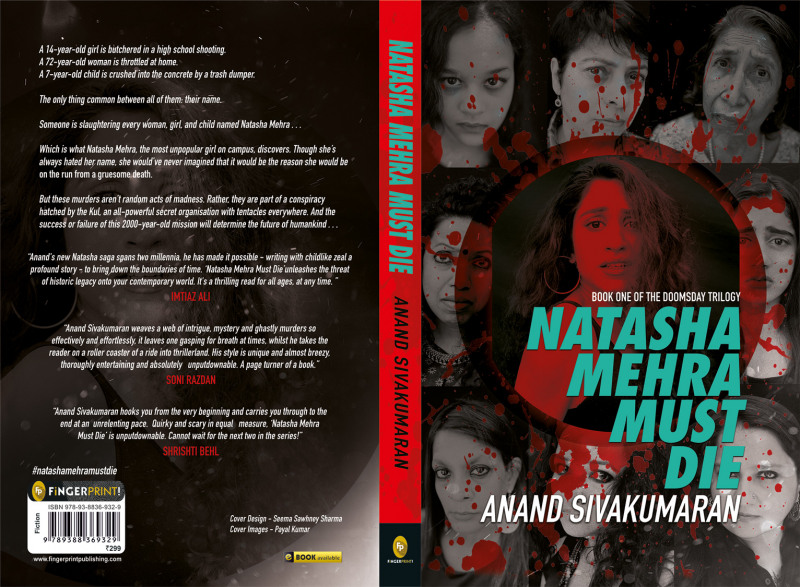On the morning of 7th February, blissfully ignorant that an extinction-level event (at least vis-à-vis her tenure on this planet) was already in motion, and that its tentacles would soon be reaching out to terminate her, Natasha went about her normal routine.
She got to Bandra station at 8.12 a.m., picked up a copy of the Midday by 8.13 a.m., and by somewhere between the big hand moving from 13 to 14, got to the platform for the 8.16 slow train to Churchgate, ready to fight elbow and shoulder for a place to rest her bum on in the second-class ladies compartment till the Marine Lines station.
It has oft been remarked that the packing density of humans in a Mumbai local train is higher than that of sardines in a can. Hence, it isn’t surprising that every cubic
But as mentioned earlier, violent physical contact was not something Natasha shirked from, and on most days she did manage to get a seat. That too with her characteristic black tee shirt and black jeans intact, not torn or crumpled by the battle to get past two score hardy contenders to that prized seat. Not always a window seat though, for all her pent-up rage, even Natasha couldn’t match the aggression of the seasoned office commuter. But she didn’t mind; as long as she had a spot amenable enough for her to bury her face inside the pages of the tabloid, she was content.
Even this perusal of the paper stemmed not from any yearning for
In order to make sure that her eyes never left the paper, Natasha read pretty much every single thing printed in the tabloid. Since she was a fast reader, and she had a good 20-odd minutes to kill, there were days when she even read the ads. But no matter how hard up she was for something to keep her eyes away from the people around, the one thing she would not read under any circumstance were the reports about crime, especially those perpetrated on women.
Why? ’Cause they made her really angry and that fire didn’t need to be stoked any further.
But just when we firmly decide on something and set ourselves on what we think is an irrevocable course of action, fate loves to spite us by ensuring that we do exactly the thing we have done mother-father swear on to never do.
So, on 7th of February, at 8.23 a.m., Natasha Mehra, despite all her determination to not do so, read a crime report. And that one act changed her life forever . . .
How? What was in that crime report? We’ll get to all that shortly. But first, the burning question is why in the name of all that’s holy did Natasha break the habit of a lifetime and examine that particular piece? Was it the glamour factor? Was there a celebrity involved? Or was it the other ‘g’—gruesome? Was the crime so gory and ghastly that she couldn’t keep her eyes off it?
Nope.
What drew her to the article actually was the one thing she hated most in the world. Her name.
Because the name of the woman who had been foully murdered was Natasha Mehra!
This one was a seventy-two-year-old woman who had been found dead in the flat where she used to live all alone. The cause of death—strangulation by person(s) unknown.
Natasha tried to avert her eyes and turn the page, but she couldn’t. She kept going back to the article, taking in every detail. Not that there were many. The killing of a senior citizen in Mumbai rarely merited more than a few column centimetres anymore.
In fact, the author of the piece had not expended words either about the possible motive behind the killing or about who the perpetrator(s) might have been. He/she probably figured that it had to be stereotypically obvious—the domestic help in a moment of greed or petty thieves who preyed on the extra vulnerable or maybe the offspring with an eye on the flat, which, with the real estate market at the level that it was, could fetch much more than the proverbial pretty penny. And hence, the author had restricted the piece to the skeletal minimum.
Which basically meant that there was hardly anything for our Natasha to read, far less spend the better part of her train ride on. However, that is exactly what she did—going over the four lines repeatedly, so much so that when she alighted at the Marine Lines station, she had left more than half the paper unread, something that had never happened before.
What’s more, the study of this piece had held Natasha in its thrall to such an extent that she almost missed her stop. It was only when the skinny ad agency receptionist, a regular on the 8.16 slow, prodded her (less out of the kindness of her heart and more because she coveted Natasha’s seat, which she usually appropriated once the collegian alighted) that Ms. Mehra
Instantly she scurried to the exit and did a running jump on to the platform, barely managing to not fall flat and inflict substantial damage to her body and attire.
Shaken up by this near mishap, she tossed the paper into a bin and set off briskly so as to be in time for her Psychology lecture. At that moment, she was convinced that the murder of the seventy-two-year-old Natasha Mehra had ceased to be of any importance in her life and would not engage her attention ever again.
If she only had the slightest inkling of how wrong she was . . .
This is the final excerpt from the book Natasha Mehra Must Die by Anand Sivakumaran.
You can pre-order the book on Amazon here.
It has already received a lot of 5-star reviews!


